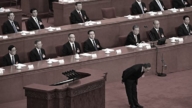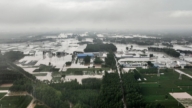【新唐人2014年05月12日訊】今年中國第一季度,有超過41%的基金集體清空所屬地產股份。同時,房地產開發商的淨負債權益比,達到2007年以來的最高水平。專家指出,地產泡沫的破滅,對整個社會來講卻是一件「好事」。我們一起來看看。
中共官媒《新華社》5月8號報導,今年一季度,房地產僅次於金融業,成為基金的第二大淨減持行業。在統計的625支股票型和混合型基金中,有258支清空地產股,清倉比例高達41.28%。
地產股已經成為各大基金的「燙手山芋」。《東方財富網》數據顯示,最近一個月以來,地產板塊,除了4月24號有3億元左右的小幅淨流入外,其他交易日一直處於淨流出狀態。5.1假期後的第一個交易日,地產板塊主力淨流出額,接近7億元。
另外,還出現了退還土地現象。日前,北京房企「中築置業」,要求退回一個月前在熱賣中買下的一塊地產,這地塊處於北京豐臺長辛店,出讓時競買保證金為4億2300萬元。《第一財經日報》評論說,成交清淡的首都,樓市成了驚弓之鳥,房地產企業的退地舉動有一定趨勢性意義。
從今年一季度淨利潤來看,51家上市房地產企業中,有12家出現虧損,超過一半的房地產企業,淨利潤同比出現下滑。據大陸Wind資訊統計,今年一季度,公募基金全部清空了這些上市房地產企業的股票。
北京師範大學MBA導師段紹譯:「這是一種理性的選擇,是一種市場的信號,中國的地產泡沫要破滅了。地產泡沫一破滅的話,對地方的財政收入還是有很大影響的,但是我認為這是個好事,如果還不破的話,會使政府更加依賴土地,並且造成資源的浪費,政府更加腐敗。」
大陸財經評論家牛刀:「中國房地產泡沫不僅要破滅,而且房價要打回原形,就是當年2008年的價格,回到那個價格。」
5月5號,大陸證券商「高盛高華」發佈的公告說,110家A股房地產財務狀況惡化,這些開發商淨負債權益比,上升到2007年以來的最高水平,它們現金餘額與短期債務之比,也返回到2008年下半年,和2011年四季度水平。
另外,開發商的經營性淨現金流也顯著惡化。一季度僅有28%的開發商經營性淨現金流為正,對比發現,這與2008年一季度的情況相當,當時 27%的開發商公布的正經營性淨現金流,為歷史最低水平。
同時,「興業證券」的報告也顯示,上市房地產企業,一季度末有息負債率為33.2%,接近歷史高位;而行業淨負債率由上季度末的78%,大幅上升到93%,達到歷史峰值。從貨幣現金比例上來看,1季度末貨幣現金比例為10.9%,也接近歷史低位。
同時,1季度負債率的大幅上升,也疊加了銷售回款的減弱和建安、土地款的支出,一些房地產企業出現了季度性的虧損,有的業績下滑幅度高達1259%,虧損額在1000萬元至1400萬元之間。
牛刀:「在房地產發生問題的時候,央行,就是包括政府,動員一切手段來維護這個房價,他不按市場來走,不按市場來走總有一天它要受到很大的懲罰,因為最後的結果,你拿任何貨幣都維護不了泡沫的時候,現在就是這樣子,已經到了雲端,已經再印鈔票沒有用了。」
北京市住房和城鄉建設委員會網站顯示,4月份,北京市二手住宅成交量達到近期以來最低水平,只有7616套;而5.1假期北京二手房成交只有31套,同比下滑超過八成,創下近6年來新低。同時,多家房地產超過8成的房源掛牌價,都進行了下調。
採訪編輯/劉惠 後製/李勇
41% Mutual Funds Eradicated the “Hot Potato” Real Estat
During the 1st quarter, about 41% hybrid mutual funds eradicated
the real estate sector. Meanwhile, the developers’ net debt to equity ratio
has reached a record high since 2007.
Professionals stated that the bubble of China’s real estate industry
is about to burst, which is a good thing for the whole society.
On May 8, the state-run media “Xinhua News Agency” reported that
real estate had become the second least profitable industry sector,
right after the financial sector, during the first quarter.
Among 625 hybrid mutual funds, 258, or 41.28%, have already
eradicated the real estate sector from the funds.
Real estate has become “a hot potato” for all big mutual funds.
The data from “eastmoney.com” show that the real estate sector
only had about 0.3 billion Chinese Yuan cash inflow on April 24 lastmonth.
All other trading days, there were only cash outflows.
During the first trading day after May 1st holiday,
the cash outflows in the real estate sector amounted to
0.7 billion Chinese Yuan.
In addition, some purchased lands have been returned.
Recently, the property enterprise “Zhong Zhu Zhi Ye”
asked to return a piece of land it purchased a month ago.
This piece of land is located in Xindian, Fengtai, Beijing.
The bidding deposit for this land was 0.423 billion Chinese Yuan.
As commented in “First Financial Daily”,
light trading market in real estate indicates the property market
has been in panic in Beijing.
The action of land returning predicts the tendency.
From the perspective of net profit, 12 out of 51 real estate stock companies
experienced a financial loss during the 1st quarter.
More than half of them suffered from a profit decrease.
Based on the statistics from “Wind Statistics”,
all public offering funds eradicated the stocks of
these real estate companies in the 1st quarter.
Duan Shaoyi, MBA mentor from Beijing Normal University,
“The choice of the mutual funds is rational.
It’s actually releasing a market signal.
The bubble of China’s real estate industry is about to burst.
Once it bursts, it’ll impact the financial income of local government tremendously.
I think it’s a good thing. If it doesn’t burst, local governments will collect
more money from lands. It’s totally a waste of resources.
It’ll only make the government more corrupt. ”
Niu Dao, financial commentator in China,
“Not only is the bubble of China’s real estate going to burst,
but housing prices will drop to the normal level as in 2008.”
On May 5, the securities firm “Goldman Sachs Gao Hua”
announced that the financial situation of 110 A-shares real estate companies
had deteriorated. The net debt to equity ratio of these developers
has reached a record high since 2007.
The cash balance to short-term debt ratio has also dropped
to the level of that in 4th quarter, 2011, or in second half year in 2008.
In addition, the next operational cash flows of those developers
have also dramatically deteriorated.
During the 1st quarter, 2014, only 28% of them have positive operational cash flows,
equivalent to the level in 2008.
At the time of 2008, 27% of the developers published positive net operational cash flows,
which were at a record low level historically.
Meanwhile, the report from “Societe Generale Securities”
shows that the percentage of debt with interest is 33.2%
among the real estate stock companies, which is a record high as well.
Whereas, the net debt rate has risen to 93% from 78% since last quarter,
which is the historical peak.
However, available cash only accounts for 10.9%,
close to the historical lowest level.
With the spiking debt ratio, a poor collection of sales payment,
and expenses on construction and land purchase,
some real estate companies have experienced financial losses.
For some of them, profit has dropped as much as 1259%,
from 10,000 to 14,000 thousand Chinese Yuan.
Niu Dao: “When the real estate industry gets into trouble,
the central bank and the government would try all means to maintain
housing prices instead of following the market.
Nonetheless, if you don’t follow the market,
you will be punished by the market sooner or later.
In the end, you can’t prevent the bubble from bursting with money anymore.
It is the case right now.
It’s cloud-high now and printing more money cannot help anymore.”
On the website of “Beijing Housing and City Construction Committee”,
it shows that the second-hand house trading volume was 7,616 in April.
During May 1st holiday, only 31 deals were completed,
which dropped more than 80% and reached a record low since the past 6 years.
Meanwhile, the price of 80% of the houses has been lowered.
Interview & Edit/Liuhui Post-Production/Liyong

























